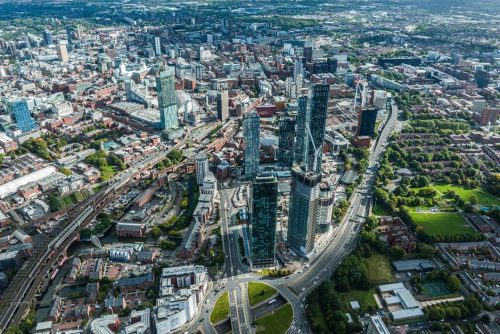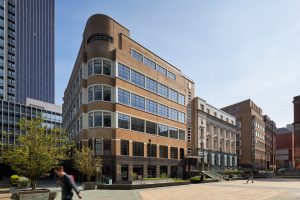Manchester hailed as best city in England for residential investment

Manchester has been named as the highest-ranking English city for residential investment, according to commercial real estate firm Colliers’ latest edition of its UK’s Top UK Residential Investment Cities report.
Manchester scored third overall in the ranking, behind Scottish cities Edinburgh, which topped the league, and Glasgow.
The biannual report analyses 20 locations in the UK against 24 indicators, including GDP, population growth, EPC rankings and leisure facilities. These indicators are grouped into five categories – economy, research and development, liveability, property and sustainability, to cover the various interests of residential investors.
Manchester’s new position as the top English city is a result of its strong economic performance, as well as favourable property factors.
The city has had a record house price growth of 33% during the past five years, far outstripping the report’s 20-city average of 15%.
It is also predicted to have a strong GDP growth at an annual rate of 2.2% during the next five years, which is also above the 20-city average of 1.8%, while the unemployment rate is forecast to average 3.7% during the same period.
In addition, Manchester’s population is projected to increase by 1.14% per annum over the next 10 years and boasts the second highest student population in Colliers’ analysis behind London. It also had a significant proportion of residents who live in rented accommodation. A further strong indicator for investment in the city is the number of entrepreneurs living in the city who are starting up new businesses.
Andrew White, Head of UK Residential & International Properties Asia at Colliers, said: “Manchester has gone through a significant transformation including redevelopment in recent years across the housing tenure mix, so it’s only natural that it would rank highly in our analysis.
“In addition, we’ve witnessed lots of large corporations and government bodies moving their headquarters to the city in the last five years, such as, JP Morgan, Octopus Energy and Rolls Royce, which has naturally resulted in increased demand for homes, and bolstered significant house price growth in the city.”

Redfern Building in NOMA
He added: “The local authority has also been very active in welcoming developers to make changes in the city through regeneration projects such as NOMA as well as build-to-rent and single-family housing developments in the city’s suburbs, so it’s not surprising at all to see Manchester rank as our highest English city for residential investment.
“Furthermore, Manchester’s economic and residential growth highlights the need for strategic expansion to meet housing demand. Angela Rayner’s recent announcement regarding the Government’s new house building plans is an important step in this direction to addressing housing shortages. As Manchester continues to attract residential investment and experience population growth, the availability of greybelt land for development will support sustainable urban expansion.
“By incorporating these additional areas, Manchester can maintain its economic success and residential appeal, providing much needed housing while preserving residents’ quality of life. Manchester’s top position in Colliers’ report showcases its growth and investment potential.”
Oliver Kolodseike, from Colliers’ Research & Economics department, compiled the analysis. He said: “While the top two cities have remained static in our latest analysis there’s been plenty of movement across the top 10 cities, mainly due to changes in GDP predictions, house price growth as well as updated data on business start-ups.
“Due to our analysis looking at a variety of indicators which are central to the residential property market, we can tailor the insights based on investors’ core drivers, whether that’s economics, housing factors or indicators which are essential for residents.”
Manchester also figured in the latest LocateVenues research from Colliers, which monitors the retail and leisure offering at commercial venues across the UK, and which has placed Manchester city centre in the top spot in a ranking of more than 25,000 retail and leisure locations nationwide.
LocateVenues analyses metrics including venue type, brand presence and strength, vacancy and refurbishment rates, floorspace availability, price positioning (value vs luxury) and category mix. The 25,000+ venues in the research, which are defined as individual destinations, range from major city centres, local town and neighbourhood shopping streets, malls, designer outlets, retail and leisure parks, to standalone grocery stores, service stations, retail in rail stations, hospitals and business parks.
Retaining its top spot since 2019, Manchester’s recognition as the UK’s leading retail and leisure destination is underpinned by several key factors. It remains the leading venue owing to its weighted count of multiple retailers and extensive trading space. Additionally, Manchester boasts the third lowest vacancy rate among its peers, which include 19 major town and city centres outside London. This low vacancy rate reflects the city’s vibrant commercial activity and strong demand for retail space.
Manchester also stands out with the highest mix of leisure offerings in its peer group, with 52% of the commercial space dedicated to activities such as cinemas, food and beverage outlets, and bowling. This is significantly higher than the 40% average for comparable locations, emphasising Manchester’s appeal as a multifaceted leisure destination.
The city was closely followed by other major city centre retail locations, with Glasgow, Birmingham, Leeds, and Liverpool making up the top five. A noteworthy shift in this year’s ranking saw Brighton take the 10th spot, indicating a notable rise in its commercial significance as a retail venue.
Due to its size and scale, the research sees London delineated into its various submarkets, with London’s Bond Street retaining its place as the most luxury-focused venue in the UK, closely followed by Bicester Village. London’s St Katherine’s Dock ranked most highly across F&B focused venues, with nearby Borough Market taking the second spot.








